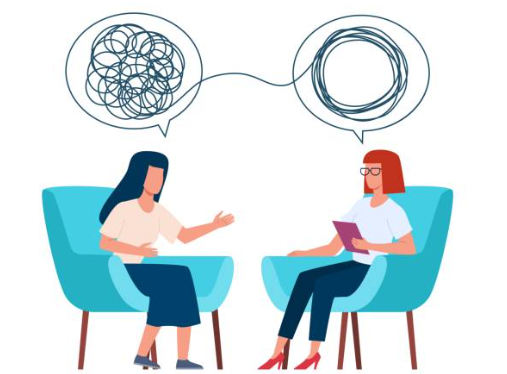
What is counseling?
The process occurs when a client and counselor set aside time to explore difficulties which may include the stressful or emotional feelings of the client.
The act of helping the client to see things more clearly, possibly from a different view-point. This can enable the client to focus on feelings, experiences or behavior, with the goal of facilitating positive change.
A relationship of trust. Confidentiality is paramount to successful counseling. A professional counselor will usually explain their policy on confidentiality. They may, however, be required by law to disclose information if they believe that there is a risk to life.
8 Benefits of Counseling
1. Less anxiety
Whether you’re suffering from panic attacks, obsessive thoughts, unrelenting worries, or an incapacitating phobia, it’s important to know that you don’t have to live with anxiety and fear. Treatment can help, and for many anxiety problems, therapy is often the most effective option. Therapy can help you uncover the underlying causes of your worries and fears; learn how to relax; look at situations in new, less frightening ways; and develop better coping and problem-solving skills. Therapy gives you the tools to overcome anxiety and teaches you how to use them
2. Greater Self Confidence
Self-confidence is a feeling or belief that you are capable of handling anything. It’s the sensation that your opinion matters and that others respect you.
Confidence makes an individual believe and feel that they have something to offer, and it takes them out of their comfort zone by challenging them to take risks, explore new opportunities, reach for more from life, conquer challenges and embrace failure on the path to success.
3. Regaining Emotional Balance
Emotional health is an important part of overall health. People who are emotionally healthy are in control of their thoughts, feelings, and behaviors. They’re able to cope with life’s challenges. They can keep problems in perspective and bounce back from setbacks. They feel good about themselves and have good relationships.
Being emotionally healthy doesn’t mean you’re happy all the time. It means you’re aware of your emotions. You can deal with them, whether they’re positive or negative. Emotionally healthy people still feel stress, anger, and sadness. But they know how to manage their negative feelings. They can tell when a problem is more than they can handle on their own. They also know when to seek help from their doctor.
4. Increase Assertiveness
Being assertive allows you to communicate your wants and needs more authoritatively while remaining fair and empathetic. It can also help you to become more self-confident, and even improve your mental health. It requires being forthright about your wants and needs, while still considering the rights, needs and wants of others. When you're assertive, you are self-assured and draw power from this to get your point across firmly, fairly and with empathy.
5. Trauma Resolution
Trauma resolution stabilizes the patient while in their current traumatic state and creates a sense of safety from previous traumatic events. A basic process in trauma resolution is allowing the person to mourn and recall distressing events. The patient can use mindfulness meditation, for example, to focus on sensations related to trauma and focus on the present moment. This process helps the patient recall experiences which may have caused trauma, enabling them to express the trauma.
6. Ability to set boundaries
Setting and keeping boundaries can be important for your identity, emotional well-being, relationships, and safety. Healthy boundaries can control your feelings, time, interactions, and physical space. Boundaries don’t have to mean separating yourself from others. Instead, they can mean establishing healthy ways to stay connected while staying true to yourself. Respecting others’ boundaries can also help you maintain healthy relationships and support the well-being of those around you.
7. Stress relief
We all deal with stress each and every day, no matter what type of job we may have, what our responsibilities may be or what our financial status currently is. Everyone is faced with some type of stress. How we deal with it is what separates the cool and comfortable from those who are anxious and on edge. But if you can effectively learn how to reduce stress, you can take the steps to regain control of your life and be a much happier person overall.
8. Better relationship
Healthy relationships with your partner and family members can enhance your life and make everyone feel good about themselves. They don’t just happen though; healthy relationships take time to build and need work to keep them healthy. The more positive effort you put into a relationship, the healthier it should be.

What to expect?
Counseling is there to provide you, with a safe non-judgmental environment, where you can explore and discuss any problems which maybe be weighing you down from the past or present.
It is a place where you can fulfill your growth potential and help you to come to a deeper understanding of yourself, by regaining confidence and self-worth.
It is about offering you empathetic support to enable you to cope with life changes which can be a rewarding and healing experience.
References:
www.skillsyouneed.com/learn/counselling.html
www.bridgetherapy.net/benefits-of-counselling
www.helpguide.org/articles/anxiety/therapy-for-anxiety-disorders